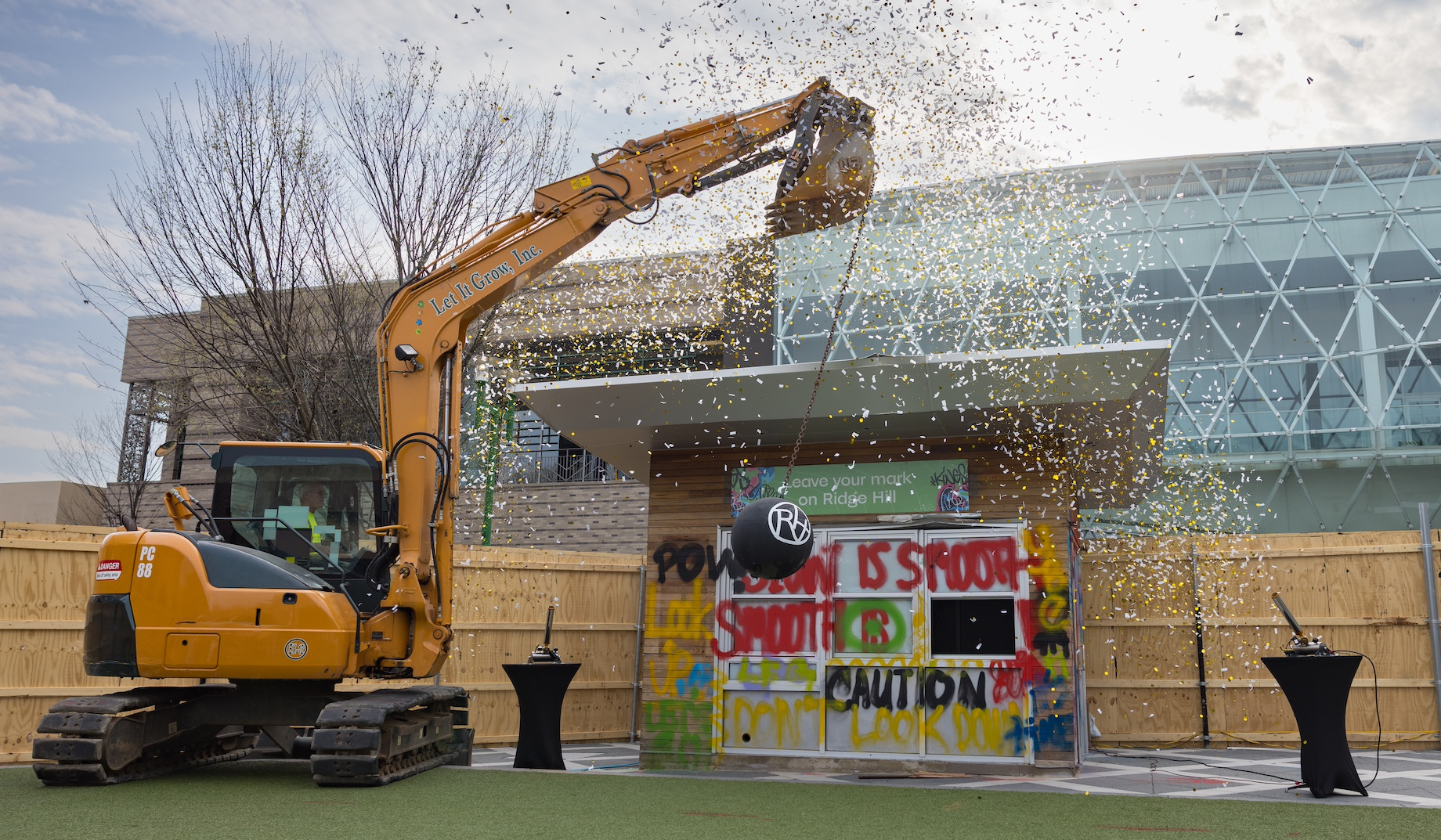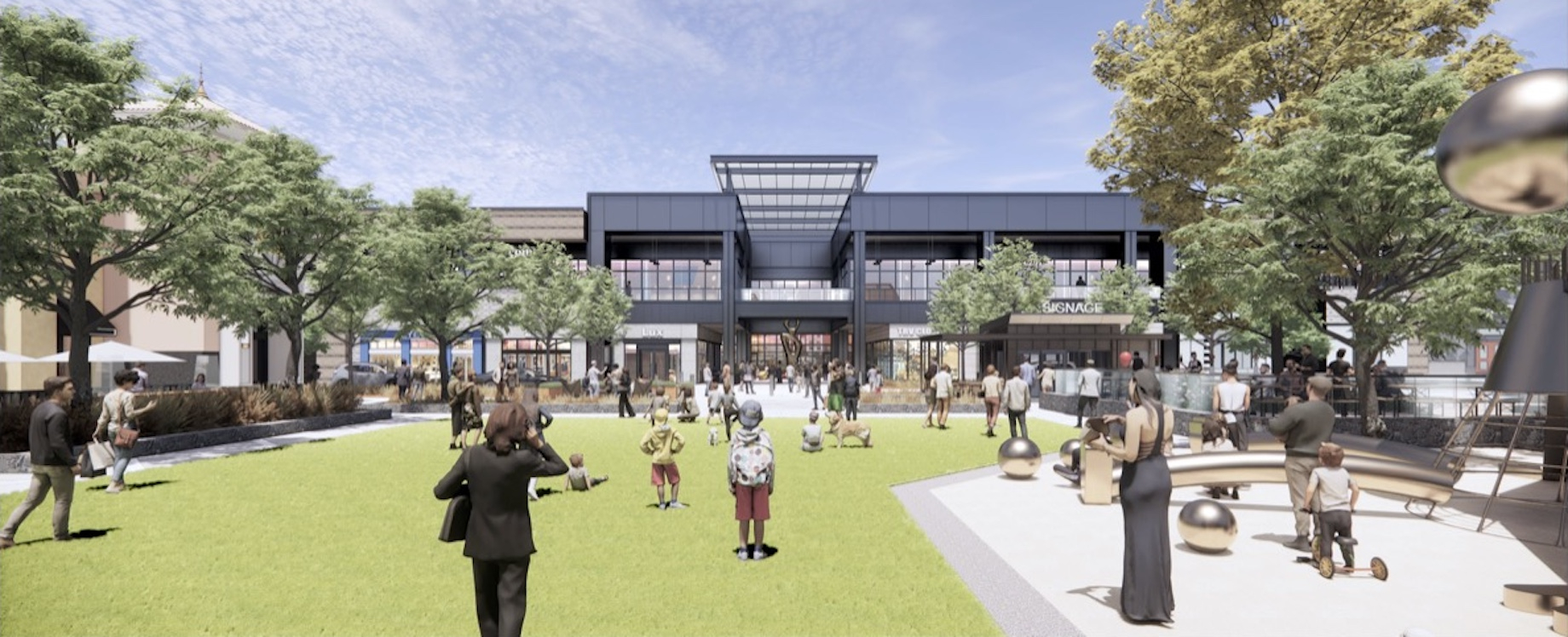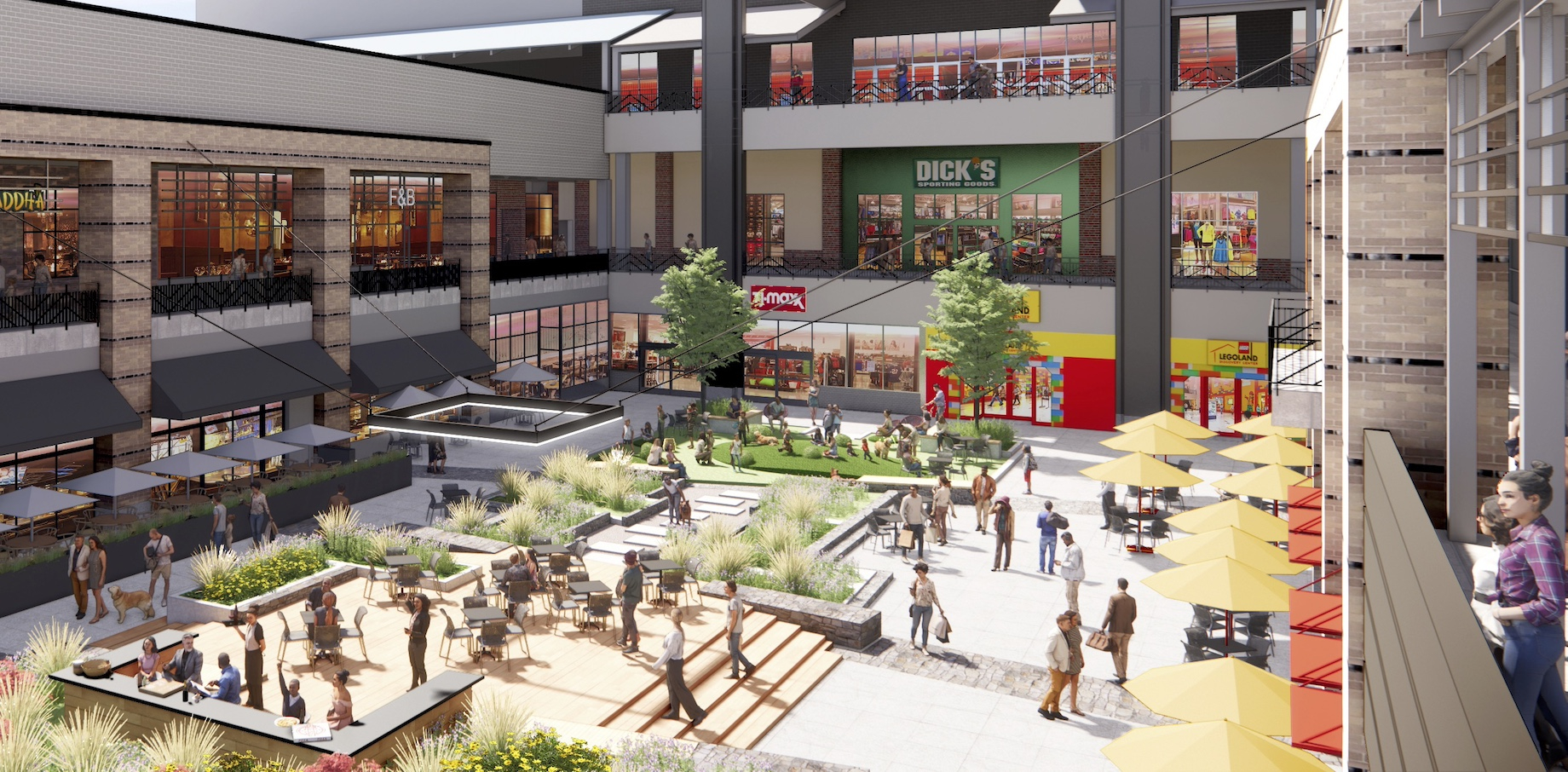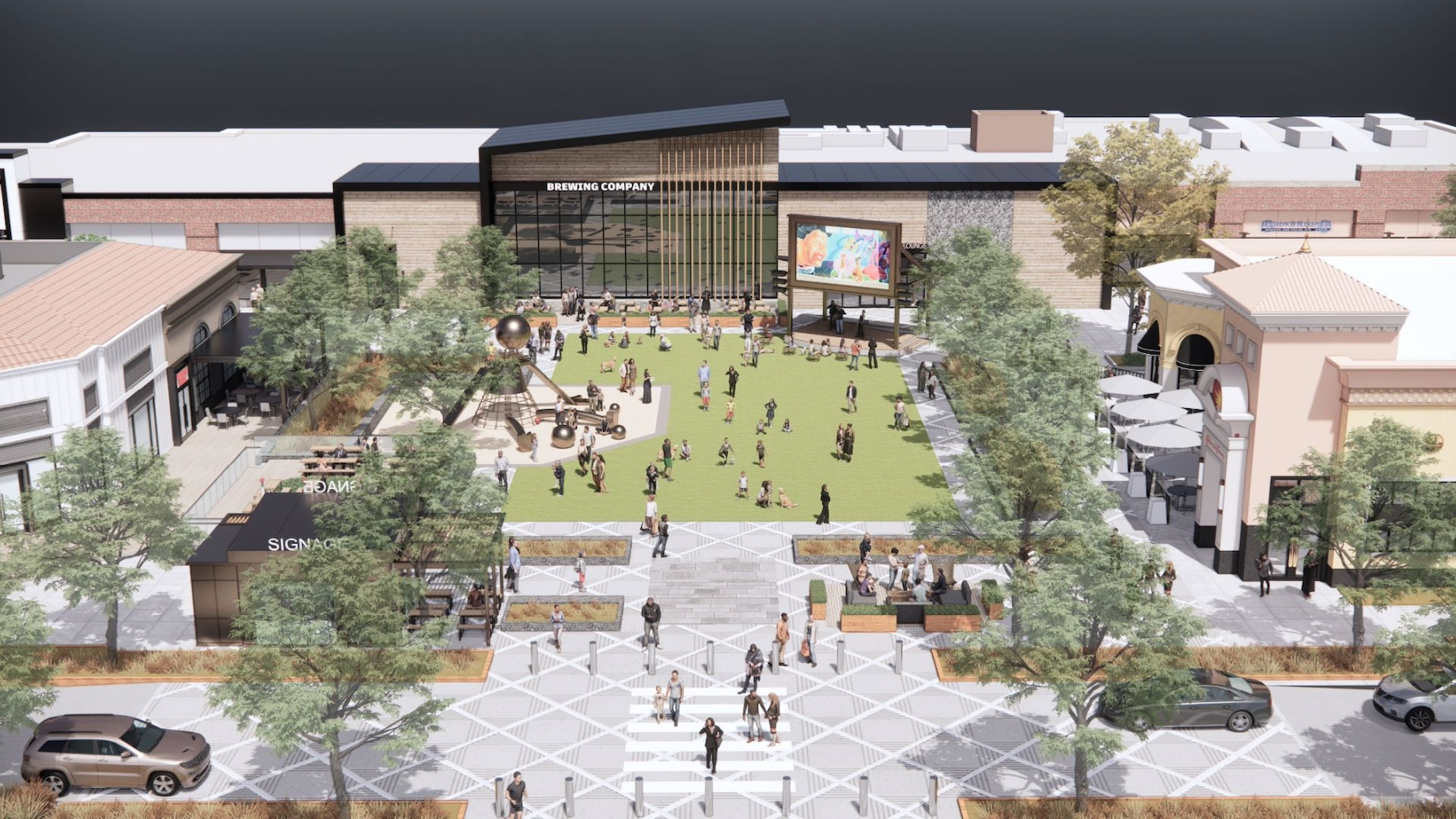Celebratory swings of the wrecking ball tend to be a big part of groundbreakings for North American Properties-led redevelopments. The latest example of such creative destruction — NAP’s rework of the open-air Ridge Hill shopping center in Yonkers, New York — kicked off on April 10. “Redevelopments are usually about adding GLA,” said NAP project executive Kevin Polston, referring to gross leasable area. “Well, ours are almost always about reducing GLA. It’s addition by subtraction.”

A celebratory swing of the wrecking ball at the redevelopment groundbreaking for Ridge Hill in Yonkers, New York. The glass-and-steel Lord & Taylor building will be partially demolished for public-realm improvements. Photo credit: Amanda Gentile
Joint-venture partners Nuveen Real Estate, Taconic Partners and NAP bought Ridge Hill — a 74-acre, 1.2 million-square-foot lifestyle center built only 13 years ago — for $220 million in 2022. Now they aim to make it a stronger draw by reinventing its public spaces, streetscapes and architectural aesthetic. Similar reinventions by NAP and its investment partners include Colony Square, Avenue East Cobb and The Forum, all in Metro Atlanta, as well as Birkdale Village in Huntersville, North Carolina.
ALSO CHECK OUT: No Development, You Say? Plenty of Mixed-Use Is Moving Dirt in Atlanta
“Experience has proven that we have to start delivering the platform and bringing the people first,” said Polston, whose firm leads the Ridge Hill redevelopment and oversees leasing and management for the property. “When we have the environment right, the retailers will come.”
Focus on Public Spaces
The JV tasked Beyer Blinder Belle with rethinking and expanding the property’s common areas, a push that will include the partial demolition of an 80,000-square-foot, glass-and-steel building formerly occupied by Lord & Taylor. “We are actually cutting off the back half of the Lord & Taylor building, which in the future could be used for residential,” said Beyer Blinder Belle partner and architect Maxwell Pau. “We’re also cutting two bays out of the remaining piece of the building, effectively expanding an outdoor plaza to create a covered paseo that can be used year-round.”
“The buildings are important, but it’s the spaces between them that are the most important. That’s where the activity and engagement happens.”
The city’s planning board has greenlit 500 residential units for Ridge Hill, including a set-aside for affordable housing, and is open to residential or other uses on the Lord & Taylor site, Polston said. “They’re encouraging us to figure out a way to exercise those entitlements and implement a residential development plan.”
Urban districts all over the world have closed streets to create breathing room for pedestrians. In a similar move, the Ridge Hill plan calls for adding about 10,000 square feet to the central plaza by closing Second Street. “Town Square is right in the heart of the development and is the most important open space that we’re revitalizing,” Pau said. In the current configuration, the architect noted, underused Second Street runs in front of a retail building, cutting it off from the rest of the plaza. “It just felt a little odd,” he explained. “We’re now extending the plaza right to the front doors of that building.”

Closing Ridge Hill’s Second Street and partially demolishing the open-air center’s 80,000-square-foot Lord & Taylor building will expand the central plaza to both the east and west. Above is the view from Town Square looking west. Rendering by Beyer Blinder Belle
The closure of Second Street and partial demolition of the Lord & Taylor building will expand the plaza to the east and west, Pau noted, creating a larger public space that “will really be quite interesting and nice for future retailers and restaurants.” Other pedestrian-friendly changes are part of the mix. “On the Market Street side, which is the main spine that connects north and south, there will be a crosswalk that is raised to the level of the sidewalk,” Pau said. “It brings you to the west side, where Apple is now.”
Meanwhile, plans call for tearing out the fountain on the north end of the property and remaking the existing 17,000-square-foot plaza into a family-friendly activity zone called Park Plaza with landscaping, seating areas, cafe tables and fire pits.

North American Properties will tear out Ridge Hill’s fountain and upgrade facades to create Park Plaza at the north end of the property.
Many redevelopments have hinged on signing deals with new tenants and then adding junior-anchor or big-box spaces per the terms of the lease, with relatively little investment in common areas. But as Polston sees it, today’s shoppers want a better experience. “The buildings are important, but it’s the spaces between them that are the most important. That’s where the activity and engagement happens.”
Reboot in Response to a Competitive Market
The redevelopment plan makes sense for Ridge Hill, given its position in the market, said Cushman & Wakefield retail services director Carl Wunderlich. The broker, whose focus includes Yonkers and Westchester County, is not affiliated with the redevelopment. “They’re opening things up and making them more pedestrian- and family-friendly with more activities, more diversified food options and places where people can hang out at the property longer,” he said. “That’s all very positive.”
Competitive pressures underscore the need for Ridge Hill to stay relevant. With more than 80 stores, nearby Cross County Center is “right down the street,” Wunderlich noted. “That mall has very good visibility and access and is right off the Cross County Parkway.” Meanwhile, The Westchester, an upscale Simon mall, is just a short drive away in White Plains. “As far as traditional malls go, it is one of the best in the area,” Wunderlich said. “It draws from Lower Fairfield County [in Connecticut] and throughout Westchester.”
In addition to Apple, the tenant roster at Ridge Hill boasts the likes of Legoland Discovery Center, Dick’s Sporting Goods, Lowe’s, Whole Foods Market, Loft, Banana Republic, T.J.Maxx, Showcase Cinema De Lux, indoor trampoline park Sky Zone and indoor skydiving concept iFLY. Bars and restaurants include The Cheesecake Factory, Yard House and Elevation Burger. “Ridge Hill has always been an entertainment hub with some good tenants,” Wunderlich said.
According to NAP spokesperson Britni Johnson, Ridge Hill’s leasing team is focused on adding more lifestyle brands and local and New York City-inspired food-and-beverage concepts. “Notable leasing deals we’ve secured since acquiring the property include Bubble Bee Tea, Cantina, Casa Fuego and D1 training,” she said.
Reducing Visual Noise
When the JV and its architects were scouting Ridge Hill, the property’s challenges were apparent. “It was very car oriented, and the second-floor retail wasn’t working,” Pau said. “Even though there were some nice retailers, you could see a lot of gaps and areas that were struggling, like the vacant Lord & Taylor building.”
Nonetheless, the property had “good bones” and “a logic to the spine of how the retail could work,” the architect said. The partners sensed another opportunity for addition through subtraction. “Reenvisioning the [Lord & Taylor] building was critical to making the core of the project an active, inviting place,” Polston said.
Beyer Blinder Belle also wanted to unify the aesthetic and reduce the amount of variation in styles, colors and materials at Ridge Hill, an approach that had worked in its redevelopment of Colony Square. “There was a lot of visual noise in terms of the existing architecture,” Pau recalled. “It was taking away from the identity of individual storefronts and retailers. It’s important that the architecture form the backbone for the storefronts so that they can stand out.”
Planned facelifts of multiple buildings, including those in Park Plaza near Legoland and T.J.Maxx, will bring consistency, Pau said. “There will be a common architectural language in terms of the colors and materials — just a much cleaner, more contemporary feel — with a lot more glass and glazing. The intent there is to have more transparency.”
Construction on some of the upgrades will be in process by the end of the summer, Polston said, and the first phase of major public-realm improvements should be ready by the holidays. “We look forward to having our tree lighting in a newly refurbished Town Square.”
Longer term, the JV partners are conducting massing studies to understand how residential, office and hotel uses could be integrated into Ridge Hill. “It just creates an environment that has more 18-hour-a-day activity. Maybe you’re walking the dog and grabbing coffee in the morning or going to happy hour or dinner at night as you come home from work,” Polston said. “It’s about inviting people into the project to become part of the community routine and experience.”

A rendering of Ridge Hill’s reinvented Town Square
By Joel Groover
Contributor, Commerce + Communities Today